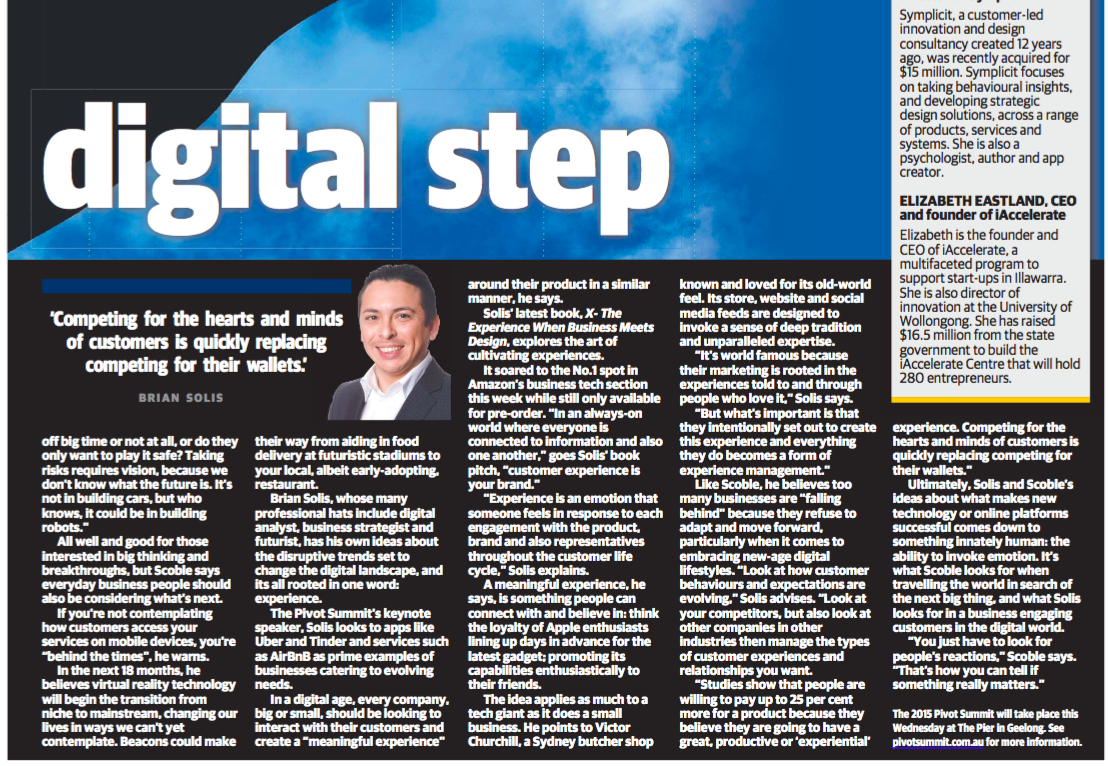
It’s been a bit of a whirlwind since the launch of X. In the last two weeks, I’ve hosted conversations about the promise of experience design in London, Düsseldorf, Oslo, Sydney and Geelong.
Somewhere along the Atlantic, I was asked to answer a few questions ahead of my arrival in Geelong for the Pivot Summit by Courtney Crane of the Geelong Advertiser. Thanks to the magic (or curse) of inflight wifi, I was able to make her deadline. But it was more than a Q&A, it was the purpose of the conversation that stopped time to reflect on how this once bustling city is proactively investigating how to build upon its history to adapt for the future.
Geelong is a port city located on Corio Bay and the Barwon River, in the state of Victoria, Australia, about an hour outside of Melbourne. The city is losing its Ford manufacturing and Alcoa aluminum plants and it has many city officials and citizens banding together to explore ways to transform the city from the likes of a Detroit to that of an Austin. Tech is of course at the heart of that conversation.
Geelong: a view from my room at the Novatel. The event is hosted at the end of the pier
I hope this conversation helps Geelong. And, I also hope that it helps you…
First of all, could you define what you see as a “meaningful experience.”
Experience is an emotion that someone feels in response to each engagement with the product, brand and also representatives throughout the customer lifecycle. A meaningful experience is something intentionally designed with reliability, believability and other attributes that align with someone’s intentions and/or expectations.
A meaningful experience is not functionality, capability, brand, customer service or the result of simply transacting with customers.
Is “cultivating an experience” different from brand management?
Brand management and marketing are often associated with the term experience. At the same time, customer support and service is also tied to experiences. But more so, the way that brand, marketing, and support strategists think about experience is often mechanical or procedural. The entire idea of cultivating an experience is understated or under appreciated.
Brand management is tied to brand strategy. And brand strategy is often a byproduct of brand architecture and promise. In the book, I talk about the reality of the “experience divide” which is a simply test in comparing the brand promise to the experience people have and share. To that regard, brand management surely comes into play as the company needs to, and often doesn’t, close the gap because they prioritize pushing the brand story rather than bringing it to life.
X = experience.
It’s the confluence of BX + UX + CX. To bring desired, meaningful experiences to life requires that we don’t start with brand architecture, we instead start with experience architecture. Then brand management has a higher purpose to serve the bigger mission. Experience is the brand. And the experiences people have becomes part of marketing.
Many of our readers own or manage small local businesses- your average cafes, plumbers, retail stores, etc. How important is it for these “average joes” to understand the digital landscape and be able to cultivate meaningful experiences?
Experience is everything. Small business is the heart of any economy. But too many are falling behind in the world as it evolves simply because they are intent to hold onto the way things have always been. Technology is one of the key pillars to delivering and managing meaningful experiences because customers are increasingly living digital lifestyles. They don’t go backward. Their behaviors and expectations only continue to evolve. It’s up to the “average Joes” to adapt or not.

I think about Victor Churchill and the incredible experience they’ve created around the idea of a traditional butcher shop. It’s world famous because their marketing is rooted in the experiences told to and through people who love it. I personally had to visit it and was completely enchanted by the experience. But what’s important is that they intentionally set out to create this experience and everything they do becomes a form of experience management.
Are those who think simply having a good product and good customer service is enough to be successful kidding themselves?
We live in a world where having a good product and/or good customer service is a competitive advantage. And it’s true for the time being. But when you study where consumerism is shifting and ultimately where it will be in the short while, the desire for all around experience, before, during and after buying, is the new “good enough.”
Studies show that people are willing to pay up to 25% more for a product because they believe they are going to have a great, productive or “experiential” experience. Competing for the hearts and minds of customers is quickly replacing competing for their wallets.
Can a mediocre product or business thrive by creating an exceptional experience around it?
I’m sure that dazzling customers this way has and will work somewhat until they recognize that they’re not able to do what it is they set out to do the way the intended to do so. Mediocrity kills. Competing for it is a short-term game. An exceptional experience means that you understand customer friction, aspirations, frustrations, vision to drive your innovation and overall experience architecture.
Technology and the online world is evolving so quickly. What key advice do you have for businesses looking to adapt and make smart decisions?
Technology is an enabler for a bigger vision. It is not the solution. Too many businesses look at technology as a way of scaling the ideas, processes, and metrics of customer engagement models of yesteryear. Start by studying the experience gap. Look at how customer behaviors and expectations are evolving. Look at your competitors, but also look at other companies in other industries the manage the types of customer experiences and relationships you want. Following the path of business as usual and using new technology to achieve it, does not change your core.
Iteration improves things.
Innovation opens new doors and creates new value.
Disruption shifts behaviors and markets.
Every business must do at least two of the above.
Are there any key trends in the digital world you believe Australian businesses should be aware of right now?
One of the reasons I believe UX is so important in the formula of experience architecture is inspired by the consumerization of technology. Without going through every trend that Australian businesses should watch, we should focus on immediate expectations. Apps like Uber, Tinder, Clear, et al., are changing how people navigate apps to accomplish goals or trigger outcomes. How they interact with these apps is one part. Add to that new services such as AirBnB and you start to see that people want services that cater to their evolving needs.
The biggest thing to realize here is that digital is changing how people make decisions and how they want to do business. They expect to engage EVERY company the way they do with their personal apps. This means that the entire funnel, the entire customer journey, each and every touch point from the Web, to sales and service teams to physical stores to CRM must be re-imagined to feel more natural to the way digital trends are impacting people.
Experience is everything…
Connect with me… Twitter | LinkedIn | Facebook | Youtube | Instagram | Pinterest

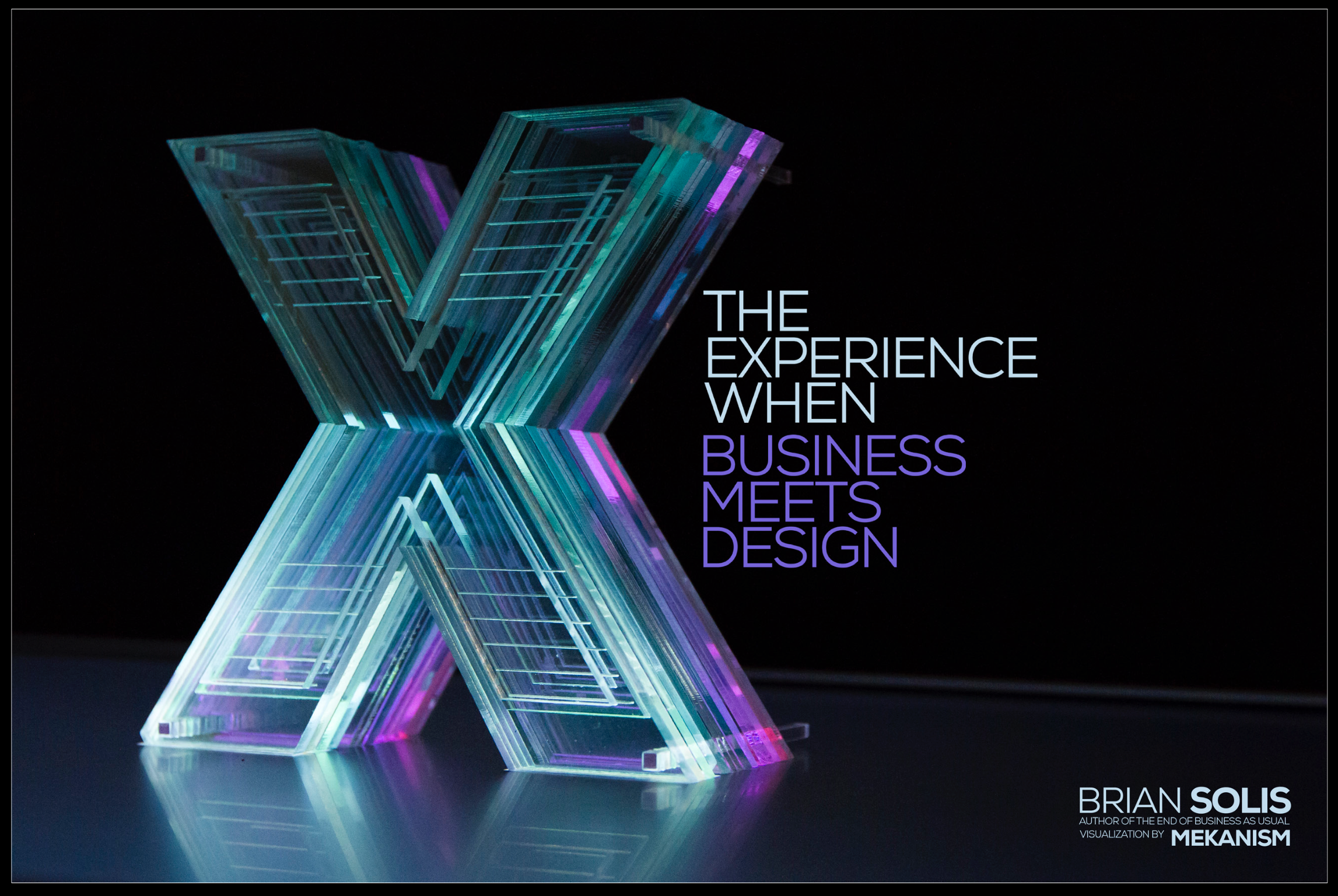
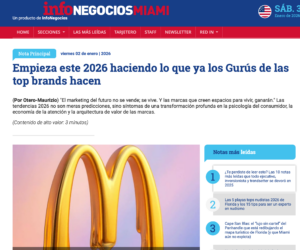
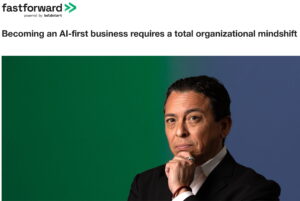
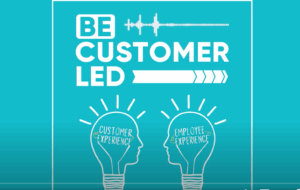


4 COMMENTS ON THIS POST To “Tracking Our Next Digital Steps”